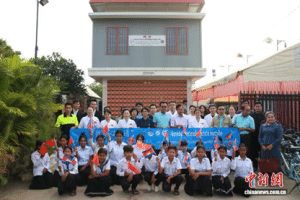Beijing Social Work Development Center for Facilitators (the Facilitators), established in 2003, is one of the first professional social work organizations in China to provide services for migrant workers.
In 2016, the Facilitators started to focus on the health of female migrant workers who were still registered as rural residents and had been working in non-agricultural industries in urban areas for at least six months.
Last October, the Facilitators launched the Health Care Action for Working Mothers and released a report informed by both quantitative and qualitative research.
A questionnaire was carried out in Zhuhai, Qingdao, and Beijing from last October to January and included 55 questions. Two-hundred-and-three valid questionnaires were returned, with 10 participants selected for in-depth interviews based on factors such as their age, occupation, and children’s situation.
Basic situation
There are nearly 80 million working mothers in China, accounting for about 27.72 percent of the total number of migrant workers.
Among the cases studied, the oldest was 66 and the youngest was 24. The average age was 42.45. As people get older and continue to stay in the workforce, their health gradually declines. The overall health of working migrant mothers was found to be not as good as that of urban residents the same age.
More than three-quarters of those surveyed had only junior high school education or less, 6.4 percent did not attend school and 19.21 percent had received only primary education. The main reason for their failure to complete compulsory education was financial hardship.
When migrant women go out to work for the first time, they usually follow their relatives from their father’s side of the family, and then, mainly follow their husbands after marriage, which reflects the patriarchal culture of many rural areas.
Another finding is their preference to work nearby. In Beijing, they are mainly from nearby provinces such as Hebei (16.22 percent), Henan (16.22 percent) and Shanxi (13.51 percent); those in Zhuhai are mainly from Guangdong (62.5 percent) and Hunan (17.05 percent); and those in Qingdao are mainly from Shandong (78.05 percent).
Family situation
A total 87.68 percent of them were married, 6.90 percent divorced, 3.94 percent widowed, and 1.48 percent were living apart from their husband. The crossover analysis found that working mothers that are divorced, separated, or widowed are more likely to have health problems than those in married households.
Just over half of the women had two children, 19.21 percent had three children, 2.46 percent had four or more, and 24.14 percent had only one.
Living conditions are another important factor. 47.78 percent share one room with their husband and children; 18.72 percent live in the same room with their parents and children.
Under the influence of traditional gender norms, working mothers often not only undertake the responsibility of making money, but also do the majority of housework.
Working situation
They choose to become migrant workers for similar reasons: the low wages on offer in their hometown and their dreams of seeing the outside world.
Just over a third have worked for five to 10 years, 22.17 percent for 10 to 15 years, 11.33 percent for 15 to 20 years, and 10.34 percent for over 20 years. Due to limited education and experience, they mainly work in jobs that can be seen as extensions of their family roles, working as domestic workers, cleaners, or restaurant staff.
This kind of repetitive manual work with minimal skill requirements can negatively impact a person’s health. Another concern is that almost half did not sign labor contracts, which limits their access to financial support when health problems occur.
Data from the survey helps to shed light on their working conditions:
- 83 percent of them work eight to 12 hours a day; 10.84 percent work more than 12 hours;
- 72 percent think their work intensity is relatively high, and 8.64 percent think it is extremely high;
- 49 percent think the working environment is bad, and 3.70 percent think it’s extremely bad;
- 29 percent feel that they do not receive enough care from colleagues and superiors at work;
- 51 percent feel they do not receive enough support from their family.
While many of these migrant women clearly work hard, their monthly income is not high, with 47.53 percent of them earning less than 3,000 yuan ($500) per month, while the average monthly income of migrant workers nationwide is 4,072 yuan.
The studies found a positive correlation between level of health and level of income. Working mothers often reduce or delay medical treatment when they experience health problems, further impacting their health.



